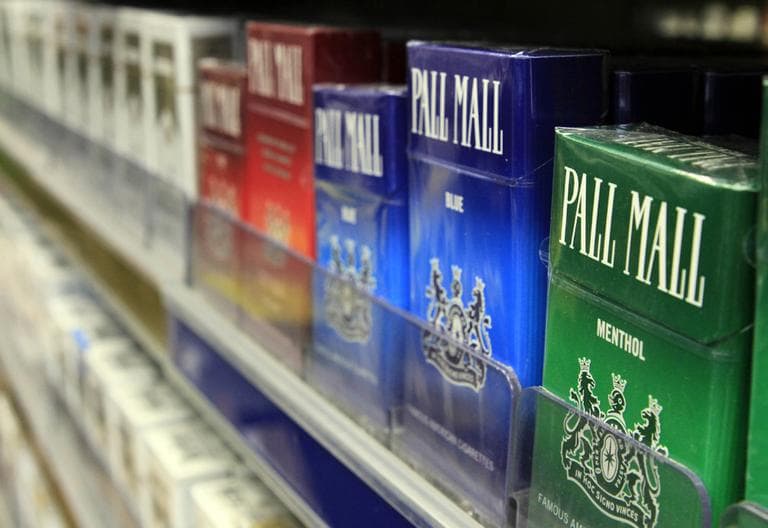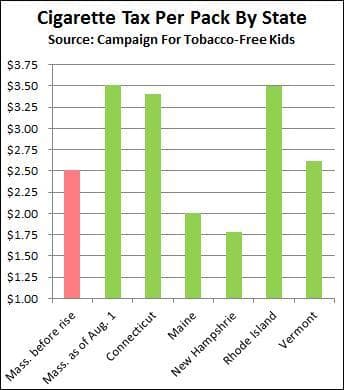Advertisement
With Higher Cigarette Taxes, Concerns About Smuggling
Resume
As of Wednesday, Massachusetts cigarette prices have increased $1 a pack, as part of the transportation finance bill passed by state lawmakers a week ago.
At $3.51 per pack, Massachusetts now has the second-highest cigarette tax rate in the country — a fact that's also raising concerns about a spike in cigarette smuggling.
Revenue Projections
In some places in Massachusetts, a pack of cigarettes now costs more than $10. But drive a half hour north of Boston, into New Hampshire, and you can find the same cigarettes for almost half the cost.
It’s one of the widest price disparities in the country, and it’s part of the reason New Hampshire is one of the biggest export states: About a quarter bought there are sold or consumed elsewhere — and not always legally.

"Smugglers will go to a source state like North Carolina and legally purchase tens of thousands of cigarettes at a time," said Michael LaFaive, director of fiscal policy at the Mackinac Center, a free market-based think tank in Michigan.
"Typically then the organization will roll semi tractor trailers or vans and then distribute the cigarettes to willing buyers at retail stores who know they're breaking the law, and are happy to do so because they'll get the smokes at a discount but sell them for the actual retail price as if the tax had been imposed on it," he said.
LaFaive estimates the current smuggling rate into Massachusetts is at about 18 percent. With the tax hike he says that rate will spike to 43 percent, costing the state 3.3 percent of its cigarette revenue.
In other words, by charging smokers more, LaFaive expects Massachusetts to lose money.
"Our model rarely predicts a net decline in revenue," he said. "Almost every excise tax forecast that we have made ... results in more revenue to a state government."
The Massachusetts Department of Revenue says it expects an extra $135 million over the next 10 months off higher tobacco taxes.
Revenue officials declined to comment on the Mackinac projections, but they say the state will convene a special commission by November to study the effects of cigarette smuggling.
There are two factors working against the state. First, Massachusetts will see a significant increase in smuggling from New Hampshire. And second, it will also see a decline in the number of smokers coming into the state from other high-tax states, like Connecticut, Rhode Island and New York.
Health Effects
But even if Massachusetts loses money, the tax still has its supporters.
Casey Harvell, public policy director for the American Lung Association Massachusetts, says the price hike will encourage 25,000 smokers to quit, and prevent 27,000 children from taking up smoking in the first place.
"Some studies have shown that for every 10 percent increase in the price of cigarettes," she said, "adult consumption is reduced by approximately 4 percent and it goes up to about 7 percent among youth."
But while raising the tax rate may lower smoking rates statewide, some studies have shown it can actually increase smoking along the border.
Michael Lovenheim — author of a 2008 study, “How Far to the Border (PDF),” which tracked casual smuggling among consumers using census data — says forcing consumers to travel can actually make them smoke more.
"So if you go across the border, you're not going to just buy a pack, right?" he said. "You've traveled. You're going to buy more than one pack, you're going to buy cartons. And then you come home and you're faced with a large amount of this addictive good, and you consume more.
"If you take cities that split state lines — so like St. Louis, for example — smoking is systematically higher on the high-tax side of the border, which doesn't really make sense, unless you think something like this stockpiling is going on."
Smuggling And Enforcement
Smuggling becomes a felony once you transport 10,000 cigarettes, or 50 cartons, at a time. The maximum penalty is five years in prison.
Under state law, possession of cigarettes without a Massachusetts stamp can carry up to one year in jail and a $1,000 fine, but there is no record of anyone prosecuted with that law in recent memory.
And then there’s the issue of enforcement. In 2009, the Bureau of Alcohol, Tobacco and Firearms devoted just 2 percent of its budget to investigating tax evasion on alcohol or tobacco, with the other 98 percent focused on firearms and explosives.
Jeff Cohen, an ATF attorney, says their main focus is on stopping violence.
"We only have 2,500 agents across the whole United States of America," he said. "And as you know coming from Boston, there's a great deal of violent crime involving firearms and explosives."
Still, Cohen admits that many commercial smuggling operations are used by organized crime, even terrorist groups, to fund their operations. The Department of Justice says one small truckload of smuggled cigarettes can fetch almost half a million dollars in profits.
But that only applies to large-scale smuggling. Smoke shop clerks and owners just over the New Hampshire border say at least 90 percent of their customers are from Massachusetts, and buy just a few cartons for themselves.
And as long as those customers don’t buy more than 49 cartons, or try to resell the cigarettes, it’s all perfectly legal, or practically impossible to enforce.
This program aired on July 31, 2013.
